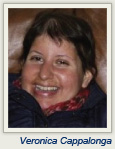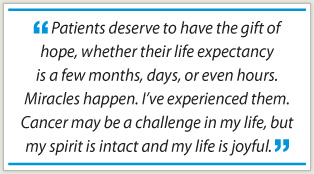 Cancer has nearly always been part of my life. When I was 6 years old, I was diagnosed with acute lymphoblastic leukemia. The doctors told my parents that unless I was treated immediately, I wouldn’t live longer than a month. Over the next 3 years, I underwent intensive courses of chemotherapy and heavy doses of cranial and full-body radiation. The therapy put me in a 7-month remission, but soon after, I was diagnosed with acute myeloid leukemia. An autologous bone marrow transplant finally cured me of leukemia, and for the next 12 years I lived a fairly normal life. I was able to return to school and played soccer, a sport I love.
Cancer has nearly always been part of my life. When I was 6 years old, I was diagnosed with acute lymphoblastic leukemia. The doctors told my parents that unless I was treated immediately, I wouldn’t live longer than a month. Over the next 3 years, I underwent intensive courses of chemotherapy and heavy doses of cranial and full-body radiation. The therapy put me in a 7-month remission, but soon after, I was diagnosed with acute myeloid leukemia. An autologous bone marrow transplant finally cured me of leukemia, and for the next 12 years I lived a fairly normal life. I was able to return to school and played soccer, a sport I love.
New Challenges
After graduating from high school, I attended Santa Monica College, where I studied communications. My goal since my illness was to help other children diagnosed with cancer—to be their voice and to let them know that they were not alone in fighting this disease. But before I could finish my education, at the age of 22, I was diagnosed with grade 4 glioblastoma multiforme. According to my doctors, this was probably the result of the high doses of cranial radiation I received as a child.
I was put on a regimen of chemotherapy that included bevacizumab (Avastin) and given conformal radiation therapy. But even with treatment, the prognosis was grim—my life expectancy was about a year-and-a-half, said my doctors.
Looking Forward
 In October, I passed the 6-year mark since that last diagnosis, and I’m still looking ahead. Although my tumor was considered inoperable when I was first diagnosed, because it had quadrupled in size within just a few days of the diagnosis, my surgeon removed as much of the cancer he could without further damaging my brain. Even before the surgery, however, the glioblastoma had left me weakened on my right side and my speech slurred. After the surgery I was completely paralyzed on my right side and I couldn’t speak. Intensive physical and speech therapy have improved my ability to speak and helped strengthened my legs, so I’m not completely dependent on my wheelchair and can usually get around with the use of a cane.
In October, I passed the 6-year mark since that last diagnosis, and I’m still looking ahead. Although my tumor was considered inoperable when I was first diagnosed, because it had quadrupled in size within just a few days of the diagnosis, my surgeon removed as much of the cancer he could without further damaging my brain. Even before the surgery, however, the glioblastoma had left me weakened on my right side and my speech slurred. After the surgery I was completely paralyzed on my right side and I couldn’t speak. Intensive physical and speech therapy have improved my ability to speak and helped strengthened my legs, so I’m not completely dependent on my wheelchair and can usually get around with the use of a cane.
Now, I’m determined to finish college. My mother, Rocio, is my lifeline. She attends classes with me, taking notes and helping me get around campus, and she’s with me as I train to make the swimming team for the 2012 U.S. Paralympics Games in London. Whether I qualify for the team or not, I plan on being at the games to cheer on my teammates. I’ll also continue to be involved in events like the Heroes of Hope Race for Brain Tumor Research to help raise awareness of brain cancer and money for research.
Living My Future
I realize how serious my condition is. But even with all my physical setbacks, emergency trips to the hospital, and delayed dreams, my experience with cancer starting when I was just a young child has taught me that nothing is set in stone—not the dire predictions from some doctors and not the physical limitations from my cancer. I’m still here. I’m still planning to have as full a life as possible. Bevacizumab is keeping my brain tumor manageable, and speech and physical rehabilitation are making me stronger. Now, I’m looking toward my future.
I would not have gotten to where I am without faith, family, community, and the major support of my doctors and nurses. Patients deserve to have the gift of hope, whether their life expectancy is a few months, days, or even hours. Miracles happen. I’ve experienced them. Cancer may be a challenge in my life, but my spirit is intact and my life is joyful. ■
Ms. Cappalonga, 28, lives in Los Angeles.

